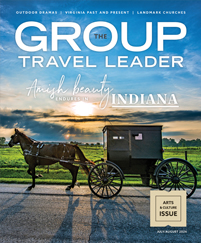Mark Ezell believes the stories of the Civil Rights Movement can change the world.
As commissioner of the Tennessee Department of Tourism Development and chair of the U.S. Civil Rights Trail Marketing Alliance, Ezell has seen firsthand how interactive encounters with the Civil Rights legacy can make lasting impacts on travelers. And he believes the U.S. Civil Rights Trail — a collection of more than 130 sites related to the social and political movement of the 1950s and 1960s — has power to do real good.
“Our dream is to increase the number of visitors, domestically and internationally, to come to these important sites, learn, transform hearts and change the world,” Ezell said. “Because that’s what has happened to us. I’m a perfect example of someone who had not been exposed to the National Civil Rights Museum [in Memphis]. I went in the first few months after I became commissioner, and it was one of the most powerful experiences I have had in my five years [on the job].”
Launched in 2018, the U.S. Civil Rights Trail is a cooperative effort to showcase historic sites, churches, museums and other places of interest integral to the Civil Rights Movement. The trail stretches from Topeka, Kansas, to Wilmington, Delaware, to Sarasota, Florida.
In the six years since its launch, the trail has brought significant levels of media coverage and public interest to its member sites and attractions. Its website, civilrightstrail.com, has logged more than 5 million visits from 43 countries. And the trail’s 23-episode podcast has won accolades from the U.S. Travel Industry Association.
But according to Ezell, those accomplishments are early steps on a longer journey.
“We have the ability to expand our reach, both in the number of sites and in the visitor experience,” he said. “And we believe there are new levels of success we can bring in our promotion, marketing, support and our creation of sites. That will help communities and change visitors.”
Adding New Sites
Every year, the U.S. Civil Rights Trail Marketing Alliance considers applications for new sites and organizations interested in joining the trail. For 2024, the trail is adding four new sites — one each in Tennessee, South Carolina, Alabama and Virginia.
In Memphis, Tennessee, the Withers Collection Museum and Gallery houses the work of Ernest Withers Sr., a photojournalist who captured many iconic images of the Civil Rights Movement.
“This museum on Beale Street is one of those gems we’re going to draw attention to,” Ezell said. “His photos told the story of the Civil Rights Movement in Memphis, especially during the Memphis Sanitation Workers Strike, which ended with the tragic assassination of Dr. King.”
Another new trail site, the recently opened International African American Museum in Charleston, South Carolina, is located on a block that was once a hub for the trans-Atlantic slave trade. The museum covers various aspects of African American history and the Black experience in America, including exhibits detailing South Carolina’s pivotal role in the Civil Rights Movement.
“They do the important work of the slavery story, which needs to be told, but also the story of Civil Rights,” Ezell said.
The new trail site in Alabama is Montgomery’s Holt Street Memorial Baptist Church, where Martin Luther King Jr. spoke to more than 5,000 people promoting nonviolent protest methods in the wake of Rosa Parks’ arrest. The meeting led to the successful Montgomery Bus Boycott.
And in Virginia, the Fredericksburg Civil Rights Trail highlights 21 places around downtown Fredericksburg and the surrounding community that were significant to the Civil Rights Movement. Ezell called the Fredericksburg trail “a little bit of a hidden gem and an untold story.”
Deepening Connections
In addition to adding new sites, the U.S. Civil Rights Trail Marketing Alliance is looking at ways to deepen connections between sites, both within specific communities and across the trail as a whole. Ezell said he recently drew inspiration from an alliance board meeting in Montgomery, where numerous Civil Rights sites work closely together to create an immersive and moving visitor experience throughout the community.
“That has really excited us,” Ezell said. “We started realizing the importance of stakeholder engagement. In Tennessee, for example, how are we working with the Civil Rights Reading Room people at the Nashville library and the Green McAdoo Cultural Center people [in Clinton] and the National Civil Rights Museum in Memphis? How are we engaging them with us and each other?
“There are more than 130 sites on the trail, mostly in the South. How do we get them to be connected with us at the state level, within their cities and also to each other? How are they building on each other so that a visitor can connect a lot more of the stories?”
To accomplish that, the marketing alliance is conducting survey work with its trail sites and creating new strategies and marketing plans that will be implemented in the coming years.
The work, Ezell said, is not just about promoting sites but also facilitating deeper change for visitors and communities.
“We get to promote a lot of great things in tourism, but there aren’t many that can also be transformative to people,” he said. “The Civil Rights sites have certainly been transformative to me. They have helped me grow, learn change and be a better person who lives in Nashville, Tennessee, and America. That feels good inside your heart.”
Travelers planning a trip on the U.S. Civil Rights Trail can find all the latest news about Civil Rights sites and events at civilrightstrail.com.











